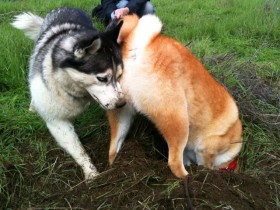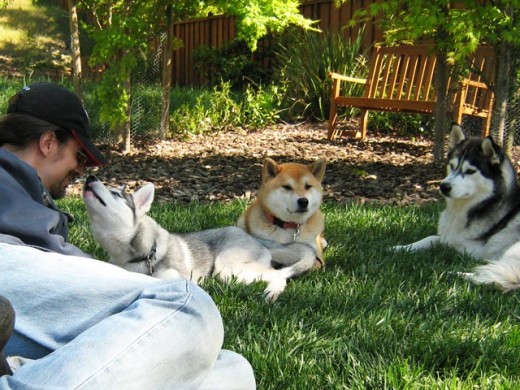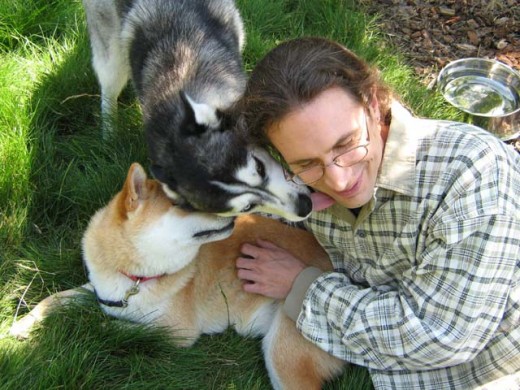I got this interesting comment from Andrew on my What is Dog Cruelty article –
Question: what is dog cruelty?
Answer: the domestication of dogs is cruel.
What do you think?
- Is the domestication of dogs cruel?
- Should dogs be left in the wild?
- Are wild dogs happier than domestic dogs?
Let us consider how our companion dogs have fared in contrast to their wild, non-domesticated brothers and sisters – the gray wolves.

Wolf vs. Dog

Gray wolves have been on and off the endangered species list since 1974. Arguments have been made over what constitutes a safe wolf population size – whether it should be 300 wolves or 2000-2500 wolves.
In contrast, based on the U.S. Pet Ownership & Demographics Sourcebook (2007 Edition), there are more than 72 million pet dogs in the U.S.
Clearly, from a survivability standpoint, dogs have done much better than wolves.
Some argue however, that population numbers alone do not indicate good quality of life. After all, some of the most populous countries have a relatively low standard of living for the majority of its citizens.
Therefore, what factors contribute most to a dog’s quality of life?
Dog Quality of Life
Here are some of the key factors that contribute to a dog’s quality of life. If I am missing any, please let me know.
- Food.
- Shelter.
- Health.
- Freedom to roam, dig, roll in skunk sauce, and other favorite dog activities.
- Pack companionship.
- Physical and mental activity.
For a quality of life comparison, let us consider each of these factors for domestic dogs and non-domestic or wild dogs (e.g. dingoes).
Should Dogs Be Left in the Wild 1 – Food and Shelter

Food and shelter.
Domestic dogs often get as much food as they want, fed to them on a silver platter.
Non-domestic dogs must work hard for their food, often traveling long distances to look for prey. Sometimes, they may go hungry for days at a time if no prey can be found.
As we encroach more and more upon the natural habitats of wolves and wild dogs, it will become difficult for them to find proper food sources and shelter.
Indeed, we should be better stewards to the wild life on this planet, and protect more of their natural ecosystems. However, human encroachment is a fact of life that all wild animals must contend with.
In terms of food and shelter, domestic dogs win out because they are provided with both. Animal laws do at least state that owners must provide their dogs with adequate food and shelter.
Should Dogs Be Left in the Wild 2 – Health
Wild dogs do not have any special health-care, aside from what they can provide to each other. On the other hand, domestic dogs are properly vaccinated against dangerous diseases (e.g. rabies, lyme disease) and can receive help and medication for allergies, joint issues, skin parasites, and much more.
As a result, domestic dogs usually have better health and live longer lives than wild dogs.
Some may say that wild dogs do not need to deal with as many human introduced health hazards, such as cars and over-feeding. That is true, but most serious health issues are faced by all dogs, including heartworm, rabies, lyme disease, and cancer.

Should Dogs Be Left in the Wild 3 – Freedom to roam, dig, and roll in skunk sauce

Freedom to dig.
Clearly wild dogs have more freedom. They need not live in a house and are free to migrate over long distances in search for food. They may dig wherever, and roll in whatever that suits their fancy. However, unlike domestic dogs, much of their time will be taken up by the search for food.
Domestic dogs live in fixed locations (houses or apartments), and often have many rules placed upon them. Many are not allowed to dig at all, and certainly rolling in skunk sauce is a big no-no. Constraints may be placed on where they can walk, how fast they walk, what they can smell, where and when they can pee, what they can eat, and much more.
As far as freedom goes, wild dogs get a much better deal than their domestic counterparts.

Should Dogs Be Left in the Wild 4 – Pack companionship

Pack companionship.
Wild dogs often live in packs and hunt in packs. A pack is helpful for survival and provides its members with companionship from their own kind.
Domestic dogs live with a human pack. In multi-dog households, they have both human and dog companionship.
However, dog owners are frequently busy and may be away for most of the day. As a result, domestic dogs may spend most of their lives chained in the yard, or left home-alone to bark at shadows.
In terms of pack companionship, domestic dogs that do receive good quality time with their pack (human and dog), have it best. They have the leisure time to enjoy the company of their family, and get to engage in a larger variety of activity and play.
On the other hand, wild dogs probably have it better than dogs that are left alone, in an empty house, for most of the day.
Sadly, it is likely that a greater number of domestic dogs fall into the latter group.

Should Dogs Be Left in the Wild 5 – Physical and mental activity
Wild dogs get physical and mental exercise every day by necessity – during the hunt for food.
Domestic dogs usually get food presented to them in a bowl, and will require other forms of physical and mental exercise. There are a variety of fun ways to exercise a dog including –
- Neighborhood walks and hikes at the park or beach.
- Dog obedience training sessions.
- Fun dog games such as flirt pole, fetch, and soccer.
- Dog sports such as agility, disc dog, fly-ball, and lure coursing.
- Fun interactive dog toys.
- Supervised play sessions with other friendly dogs.
A domestic dog that gets a good mix of these activities every day has it better than a wild dog. However, dogs that are not exercised and walked regularly, will have a lower quality of life.

Is the Domestication of Dogs Cruel?
When I started writing this article – I did not think so.
My intent was to state the pros and cons, then clearly show that domestic dogs have a better life than wild dogs. However, after writing this article, the results are not clear at all.
Andrew makes a good point.
It is probable that many domestic dogs have a lower quality of life than wild dogs. Luckily, there are also a fair number of domestic dogs that enjoy a very good life with their human family; one that is filled with understanding, joint activity, and a lot of pack companionship.
In the end, the question of quality of life for a domestic dog comes down to us – how we treat our dogs, and what laws we enact to protect them. It can be a great life for a dog, if we care to attend to their very simple needs.
Dogs are pack animals and need to spend time with their family. They also need exercise and positive outlets for their doggy-energy. That is why it is most important to consider our current time commitments and constraints before getting a dog.

The question is not whether domestic dogs are happier in the wild, but whether ecosystems have the carrying capacity to cope with their presence and the answer is “No!” When you consider the territory of a wolf pack when compared to the number of dogs inhabiting the same territory, you have to admit that we should never have domesticated wolves. When dogs were prevented from parts of the Somerset Wildlife Trust’s nature reserve in the UK, otter and cubs were seen for the first time in years and grass snakes started bath on the path. Please see https://www.theguardian.com/environment/2022/feb/07/dog-pee-and-poo-harming-nature-reserves-study and listen to: “An Environmental Pawprint” https://www.bbc.co.uk/programmes/m001cpbv
I consider this entire argument to be invalid.
Because there is no ‘wild’ for a dog to go to.
Dogs are not ‘tame wolves’. They are genetically engineered to be compatible with humans. Dogs have no place in the wild. Wolves do. Dogs do not. If we take out the word ‘wild’ and replace with ‘natural habitat’, then I agree completely. Dogs should be in their natural habitat.
Thing is… uh… for a dog, their natural habitat is a human living room.
There is no such thing as a natural habitat in the ‘wild’ for a dog. They might not be the same species, but I think of dogs as belonging to the ‘human tribe’… the only other species that belongs to this tribe on that level.
They were the first domesticated animal, possibly by 10’s of thousands of years based on some new finds. They’ve never really been ‘pets’, nor ‘livestock’, but companions and partners to humans. It’s actually a very interesting relationship that is unlike anything else on the planet. Basically, having no clue what they were doing, our ancestors genetically engineered a perfect companion species to work with us… and live with us. There is no ‘wild’ for a dog, you actually can’t separate dogs from humans because dogs would simply not exist if not for their interaction with humans. They’d be wolves then. Nor, interestingly, can you really separate humans from dogs. There are no human cultures devoid of dogs. Not since at least the last ice age. They are universal to our species like language and tool making.
A dog’s natural state is to be with humans as friends, partners and companions. I am going to argue that these species belong together and both species benefit from the relationship. This is a very deep, and very old relationship. If some of the new dates are to be believed, then dogs have been hanging out with humans at least 3 times longer than any other ‘domestic’ animal.
They’ve evolved down a different path than wolves. For example, some recent studies have shown that dogs read human emotions better than any other animal… including humans. They can understand gestures as communication in ways that chimps struggle with. These are things that dogs do easily, that wolves can not do. Dogs have evolved to be able to understand us, to work with us, to live with us. It’s what makes a dog a dog and not a wolf.
I am not trying to say that dogs are ours to do with as we please. I don’t even like the term ‘owner’ when talking about my dog. He is not property, he is a friend that I consider a part of my family. But dogs exist because of the interaction between their ancestors and our ancestors which caused them to deviate from wolves. They’ve evolved to be compatible with humans and live in our world.
You want to release a dog into the wild? Get a good fire going in the fireplace and give your dog a treat to enjoy while lounging in the living room. There is a dog ‘in the wild’. Our living rooms may have changed, but even if it was an ice age hut made of hides and mammoth bones… we still had dogs curling up next to us and the fire. This is actually their natural state.
I do think we owe dogs more than a little. There are even some theories being forwarded that dogs are actually the reason we are still here… and Neanderthal is not. What kind of survival advantage did dogs grant our species? This was a complete game changer in terms of human hunting efficiency on par with the first stone tipped spears. Not even the invention of the gun had as much impact on human hunting ability. They’ve been doing a lot for our species for a very, VERY long time. And even today, they still help our species.
They can be treated better than they are. I’d like to see all shelters become ‘no kill’. I want puppy mills outlawed. I think dog abuse should carry tougher penalties and even mandatory psychological counseling.
But I don’t think driving a Golden Retriever out the middle of nowhere in a forest somewhere and releasing him into the ‘wild’ is doing that dog any favors. That’s not where they belong. A Golden Retriever belongs right where mine is… laying down next to me as I write this post.
Brilliant
Okay, I’ll take a bite here.
I’m going to expand on the comparison of dog ownership to child rearing after I read James’ comments.
While some might argue that the goal of raising a child is to ultimately free that child into adulthood where they can think for themselves, I would like to add that children who have severe mental retardation will always need someone else to care for or look after them and they may never be able to be completely free or independent as they can only do what they want on someone else’s terms. If the “true intent” of a species is to live life as freely as they wish and a severely mentally retarded child cannot live as freely as they wish, wouldn’t their existence essentially contradict the purpose of a species to live freely? After all they are a part of a species.
I’m not judging here, but I just want to hear other people’s opinions (Yes, that includes everyone who has the right to comment here). If keeping dogs is truly “inhumane” because it denies them their freedom for life, wouldn’t raising a child with severe mental retardation (excuse my language) be considered cruel and inhumane because that child will never be free to do what they want when they want to because they want to?
I could get into really controversial territory but then I would go off topic. However, if you want me to say more, feel free to reply.
I don’t think domesticating animals in itself if cruel, it all depends on the quality of life of that animal. It is perfectly possible for dogs to be just as happy domesticated as they would be wild, if not more so. Dogs don’t know what they are missing out on not being wolves, it is not like they can think: “if only I was a wolf I would be able to go where I like, then I would be happier”. This would require the ability to think about their own emotional state and how it can be adjusted as well as knowledge of wolf-life and the ability to assume/ imagine they must be happy because they are free. I seriously doubt that dogs have the mental capacity for any of that. Dogs, most probably are creatures of the moment, their happiness being based on their condition and environment at the time (because of this I disagree that to be happy they need to live a ‘natural life’, no they just need to have what makes them happy at the time, if they are hungry they need food, if they are tired they need rest, if they are bored they need interaction or some form of mental enrichment etc and if people can’t fulfill these needs then they shouldn’t own a dog).